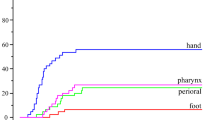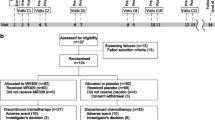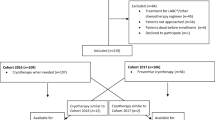Abstract
Background/Purpose
Oxaliplatin-associated neuropathy remains a dose-limiting toxicity of the standard chemotherapy regimen of oxaliplatin and capecitabine for metastatic colorectal cancer. No preventive strategy has definitively been established. Because this neuropathy is triggered by cold, we hypothesized that infusing oxaliplatin at 37°C might reduce neuropathy.
Methods
In this open-label pilot feasibility trial, patients with no prior chemotherapy for metastatic colorectal cancer were included. Treatment consisted of capecitabine 1,000 mg/m2 bid on days 1–14 and oxaliplatin 130 mg/m2 on day 1 of a 21-day cycle. The oxaliplatin infusion was administered through a fluid-warming device at a constant temperature of 37°C over 2 h. The primary endpoint was feasibility and drug reactions during the infusion. Secondary endpoints included acute and chronic neuropathy as well as response rate.
Results
Twenty patients were enrolled, and a total of 95 cycles administered. Median cumulative oxaliplatin dose was 735 mg/m2. Apart from one patient with laryngeal spasm, no other infusion-related adverse events were observed. Of the patients, 35% reported grade 3/4 acute dysesthesia or paresthesia according to a patients questionnaire. Chronic neuropathy according to NCI CTC v3.0 was observed in 85% (grade 1) and 15% (grade 2), respectively. The overall response rate was 45% (95% CI 23–67%; 5% complete remission; 40% partial remission) and stable disease was achieved in another 30% of patients.
Conclusion
Administration of heated oxaliplatin in combination with capecitabine is feasible and well tolerated without additional toxicity. While we have observed a relatively low rate of chronic cumulative neuropathy with heated oxaliplatin, this procedure appears not promising enough for us to recommend its further clinical evaluation.



Similar content being viewed by others
References
Todesursachenstatistik Schweiz 2001–2002 (2005) Bundesamt für Statistik, Neuchatel, Switzerland. www.bfs.admin.ch
Borner MM, Dietrich D, Stupp R, Morant R, Honegger H, Wernli M, Herrmann R, Pestalozzi BC, Saletti P, Hanselmann S, Muller S, Brauchli P, Castiglione-Gertsch M, Goldhirsch A, Roth AD (2002) Phase II study of capecitabine and oxaliplatin in first- and second-line treatment of advanced or metastatic colorectal cancer. J Clin Oncol 20:1759–1766
Cassidy J, Tabernero J, Twelves C, Brunet R, Butts C, Conroy T, Debraud F, Figer A, Grossmann J, Sawada N, Schöffski P, Sobrero A, Van Cutsem E, Diaz-Rubio E (2004) XELOX (capecitabine plus oxaliplatin): active first-line therapy for patients with metastatic colorectal cancer. J Clin Oncol 22:2084–2091
Cassidy J, Clarke S, Diaz-Rubio E, Scheithauer W, Figer A, Wong R, Koski S, Lichinitser M, Yang TS, Rivera S, Couture F, Sirzén F, Saltz L (2008) Randomized phase III study of capecitabine plus oxaliplatin compared with fluorouracil/folinic acid plus oxaliplatin as first-line therapy for metastatic colorectal cancer. J Clin Oncol 26:2006–2012
Grothey A (2003) Oxaliplatin-safety profile: neurotoxicity. Semin Oncol 30:5–13
Gamelin E, Gamelin L, Bossi L, Quasthoff S (2002) Clinical aspects and molecular basis of oxaliplatin neurotoxicity: current management and development of preventive measures. Semin Oncol 29:21–33
Grothey A (2005) Clinical management of oxaliplatin-associated neurotoxicity. Clin Colorectal Cancer 5(Suppl. 1):S38–S46
Elias D, Sideris L, Pocard M, Ede C, Hassouna D, Ducreux M, Boige V, Cote JF, Lasser P (2004) Efficacy of intraperitoneal chemohyperthermia with oxaliplatin in colorectal peritoneal carcinomatosis. Preliminary results in 24 patients. Ann Oncol 15:781–785
Elias D, Bonnay M, Puizillou JM, Antoun S, Demirdjian S, El OA, Pignon JP, Drouard-Troalen L, Ouellet JF, Ducreux M (2002) Heated intraoperative intraperitoneal oxaliplatin after complete resection of peritoneal carcinomatosis: pharmacokinetics and tissue distribution. Ann Oncol 13:267–272
Therasse P, Arbuck S, Eisenhauer E, Wanders J, Kaplan R, Rubinstein L, Van Glabbeke M, van Oosterom A, Christian M, Gwyther S (2000) New guidelines to evaluate the response to treatment in solid tumors. J Natl Cancer Inst 92:205–216
Levi FA, Zidani R, Vannetzel JM et al (1994) Chronomodulted versus fixed-infusion-rate delivery of ambulatory chemotherapy with oxaliplatin, fluorouracil and folinic acid (leucovorin) in patients with colorectal cancer metastases: a randomized multi-institutional trial. J Natl Cancer Inst 86:1608–1617
Leonard GD, Wright M, Quinn MG, Fioravanti S, Harold N, Schuler B, Thomas RR, Grem JL (2005) Survey of oxaliplatin-associated neurotoxicity using an interview-based questionnaire in patients with metastatic colorectal cancer. BMC Cancer 5:116
Sorbye H, Köhne CH, Sargent DJ, Glimelius B (2007) Patient characteristics and stratification in medical treatment studies for metastatic colorectal cancer: a proposal for standardization of patient characteristic reporting and stratification. Ann Oncol 18:1666–1672
Borner M, Koeberle D, Von Moos R, Saletti P, Rauch D, Hess V, Trojan A, Helbling D, Pestalozzi B, Caspar C, Ruhstaller T, Roth A, Kappeler A, Dietrich D, Lanz D, Mingrone W (2008) Adding cetuximab to capecitabine plus oxaliplatin (XELOX) in first-line treatment of metastatic colorectal cancer: a randomized phase II trial of the Swiss Group for Clinical Cancer Research SAKK. Ann Oncol 19:1288–1292
Gamelin L, Boisdron-Celle M, Delva R, Guérin-Meyer V, Ifrah N, Morel A, Gamelin E (2004) Prevention of oxaliplatin-related neurotoxicity by calcium and magnesium infusions: a retrospective study of 161 patients receiving oxaliplatin combined with 5-fluorouracil and leucovorin for advanced colorectal cancer. Clin Cancer Res 10:4055–4061
Hochster HS, Grothey A, Childs BH (2007) Use of calcium and magnesium salts to reduce oxaliplatin-related neurotoxicity. J Clin Oncol 25:4028–4029
Gaemlin L, Boisdron-Celle M, Morel A, Poirier AL, Berger V, Gamelin E, Tournigand C, de Gramont A (2008) Oxaliplatin-related neurotoxicity: interest of calcium-magnesium infusion and no impact on its efficacy. J Clin Oncol 26:1188–1189 author reply 1189–1190
Grothey A, Hart LL, Rowland KM, Ansari RH, Alberts SR, Chowhan NM, Shpilsky A, Hochster HS (2008). Intermittent oxaliplatin administration and time-to-treatment failure in metastatic colorectal cancer: final results of the phase III CONcePT trial. Proc ASCO Annual Meeting, abstract 4010
Cassidy J, Bjarnason GA, Hickish T, Topham C, Provencio M, Bodkoky G, Landherr L, Koralewski P, Lopez-Vivanco G, Said G (2006) Randomized double blind placebo controlled phase III study assessing the efficacy of xaliproden in reducing the cumulative peripheral sensory neuropathy induced by the oxaliplatin and 5-FU/LV combination (FOLFOX4) in first line treatment of patients with metastatic colorectal cancer. Proc ASCO Gastrointestinal Cancers Symposium, abstract 229
Wang WS, Lin JK, Lin TC, Chen WS, Jiang JK, Wang HS, Chiou TJ, Liu JH, Yen CC, Chen PM (2007) Oral glutamine is effective for preventing oxaliplatin-induced neuropathy in colorectal cancer patients. The Oncologist 12:312–319
Lin PC, Lee MY, Wang WS, Yen CC, Chao TC, Hsiao LT, Yang MH, Chen PM, Lin KP, Chiou TJ (2006) N-acetylcysteine has neuroprotective effects against oxaliplatin-based adjuvant chemotherapy in colon cancer patients: preliminary data. Support Care Cancer 14:484–487
Cascinu S, Catalano V, Cordella L, Labianca R, Giordani P, Baldelli AM, Beretta GD, Ubiali E, Catalano G (2002) Neuroprotective effect of reduced glutathione on oxaliplatin-based chemotherapy in advanced colorectal cancer: a randomized, double-blind, placebo-controlled trial. J Clin Oncol 15:3478–3483
Cavaletti G, Jann S, Pace A, Plasmati R, Siciliano G, Briani C, Cocito D, Padua L, Ghiglione E, Manicone M, Giussani G (2006) Multi-cener assessment of the total neuropathy score for chemotherapy-induced peripheral neuropathy. J Peripher Nerv Syst 11:135–141
Andre T, Boni C, Mounedji-Boudiaf L, Navarro M, Tabernero J, Hickish T, Topham C, Zaninelli M, Clingan P, Bridgewater J, Tabah-Fisch I, de Gramont A (2004) Oxaliplatin, fluorouracil and leucovorin as adjuvant treatment for colon cancer. N Engl J Med 350:2343–2351
Stephens RJ, Hopwood P, Girling DJ, Machin D (1997) Randomized trials with quality of life endpoints: are doctors’ ratings of patients’ physical symptoms interchangeable with patients’ self ratings? Qual Life Res 6:225–236
Argyriou AA, Polychronopoulos P, Koutras A, Iconomou G, Gourzis P, Assimakopoulos K, Kalofonos HP, Chroni E (2006) Is advanced age associated with increased incidence and severity of chemotherapy-induced peripheral neuropathy? Support Care Cancer 14:223–229
Author information
Authors and Affiliations
Corresponding author
Additional information
This trial was supported by a research grant from Sanofi Aventis Suisse SA
Rights and permissions
About this article
Cite this article
Cathomas, R., Köberle, D., Ruhstaller, T. et al. Heated (37°C) oxaliplatin infusion in combination with capecitabine for metastatic colorectal carcinoma: can it reduce neuropathy?. Support Care Cancer 18, 1263–1270 (2010). https://doi.org/10.1007/s00520-009-0740-1
Received:
Accepted:
Published:
Issue Date:
DOI: https://doi.org/10.1007/s00520-009-0740-1




